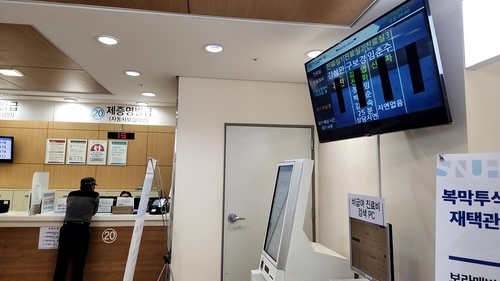- California Assembly OKs highest minimum wage in nation
- S. Korea unveils first graphic cigarette warnings
- US joins with South Korea, Japan in bid to deter North Korea
- LPGA golfer Chun In-gee finally back in action
- S. Korea won’t be top seed in final World Cup qualification round
- US men’s soccer misses 2nd straight Olympics
- US back on track in qualifying with 4-0 win over Guatemala
- High-intensity workout injuries spawn cottage industry
- CDC expands range of Zika mosquitoes into parts of Northeast
- Who knew? ‘The Walking Dead’ is helping families connect
Patients denied of appointments, protest bitterly as SNU doctors stage walkout
Patients were denied appointments and sent home without treatment as a majority of doctors at Seoul National University Hospital (SNUH) and its three affiliates went on an indefinite walkout, demanding reconsideration of the medical school quota hike.
On Monday, 529 senior doctors, or 54.7 percent of those at SNUH and its three affiliates, began an indefinite strike in protest against the government’s first increase of the nationwide medical school admission quota in 27 years, by about 1,500 slots for next year.
The walkout is set to be followed by a nationwide one-day general strike by community doctors on Tuesday, although only a fraction of them are expected to join the collective action.
Doctors at SNUH, one of the most prominent university general hospitals in South Korea, are demanding that the government cancel administrative penalties imposed on protesting trainee doctors and reconsider the 2025 medical school quota hike.

Patients visiting SNUH and its affiliated hospitals found themselves unable to reserve appointments with doctors or were sent home empty-handed upon discovering that their doctors were unavailable for services.
A 69-year-old patient, surnamed Kwon, was informed that the earliest available appointment would be August next year at best when he visited SNUH in central Seoul for dizziness.
Kwon, a chronic heart disease patient, found that the recent development of dizziness made even eating difficult.
“Who knows what will happen to me by then,” Kwon protested. “I’m not sure exactly why doctors are doing this, but I hope they won’t leave sick patients alone,” he said.
A 74-year-old patient, surnamed Lee, had to go home empty-handed after discovering that her doctor of 20 years at SNU Boramae Medical Center’s diabetes and endocrine center in southern Seoul was not working on the day.
“I missed the text message informing me about the doctor’s leave because I often leave my mobile phone unattended,” the patient said.
“Fortunately, I was told that the doctor will be available tomorrow, so I will come back,” the patient added.
The thyroid disease center at SNUH was deserted without patients early Monday, while a message at the rehabilitation department of the Boramae center informed visitors that no services were available on the day.
An electronic information board at Boramae’s gastroenterology department indicated that 1 out of 3 doctors was on leave.
Some cancer wards and the circulatory-internal medicine department at SNUH, meanwhile, remained as busy as any ordinary business day.
A 63-year-old man who accompanied his sick mother to Boramae said the waiting lines were longer than usual at departments where the services were still available, stressing that “patients’ lives should not be a matter of tug-of-war.”
The government has warned of stern responses against collective action by senior doctors and requested general hospital heads to consider invoking the right to indemnity to demand striking doctors to reimburse any financial losses stemming from their walkout.












